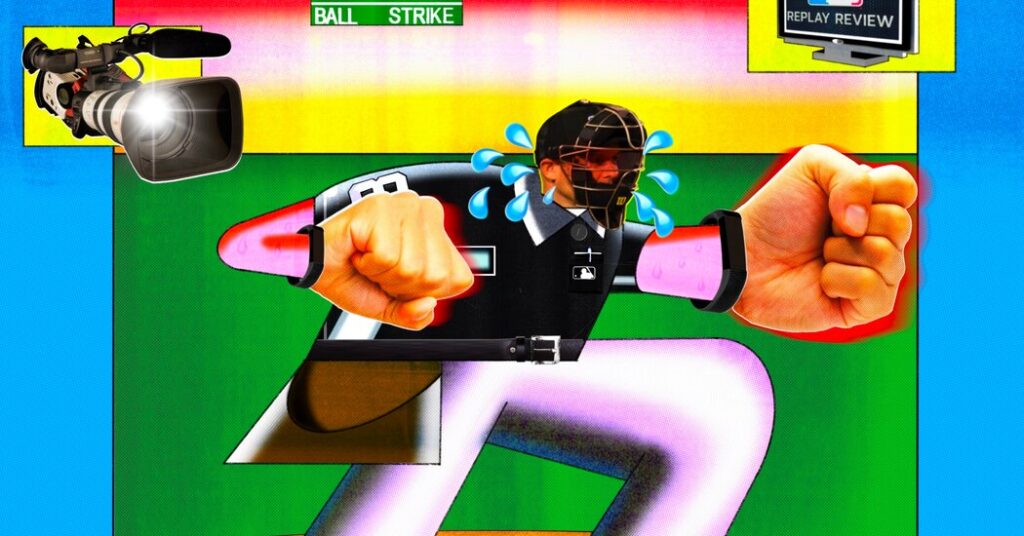Umpires tend to make headlines for one of two reasons — because they’ve blown a call or blown a fuse — and unfortunately for Hernandez, over the course of his 30 years in the major leagues, he has acquired a reputation for doing both. The latter took years to acquire, aided by a series of high-profile tempests of all varieties — skirmishes, ejections, missed calls — culminating in a single nightmare game during the 2018 playoffs, when he had three calls overturned at first base. He was also at the center of one of M.L.B.’s earliest replay-review controversies, in 2013, which is maybe why it still lingers — he committed the original sin.
During an otherwise forgettable early-season game on May 8 that year, the Oakland A’s were down 4-3 in the top of the ninth to Cleveland when the A’s hit what appeared to be a game-tying home run. The ball ricocheted off the railing just above the left-center fence, but the umps ruled that it had struck the top of the wall, instead making it a ground-rule double. Hernandez was the interim crew chief that day, so it was his job to leave the field, retreat to a tiny closet in the bowels of the stadium and study a grainy replay. Hernandez needed “clear and convincing evidence” to overturn the ruling on the field, which was impossible on the replay closet’s 17-inch Panasonic monitor, so he didn’t overturn it. Upholding the wrong call was the right call, but he still was slaughtered for it. From then on, Hernandez was considered one of those embittered, antiquated umps who seethed at having to admit he was wrong, even when we all could see it with our own eyes, thanks to our vastly superior technology at home.
Long before this episode, though, Hernandez had become known around the league for seeming a bit too eager to mix it up with players and managers, for making nitpicky calls, for drawing attention to himself, a critique that keeps popping up in media accounts from the era and even in his performance evaluations from his bosses at M.L.B. He and West were kindred spirits, old-school hard-liners, and the older-school hard-liners who had tutored them were blunt about the rules of engagement with players: “You don’t trust any of ’em,” says Scott, who published a memoir last year called “The Umpire Is Out,” chronicling his career through this era as a mostly closeted gay umpire in the big leagues. “They’re all out to get you.” This seemed to come naturally to Hernandez. “Some of the Latin umpires and the Latin players would joke around with him,” West told me. “He didn’t do any of that, and so right away, that was a strike against him, as far as the players are concerned.” It was a strike in his favor, as far as Joe West was concerned. “There is no gray matter in Angel Hernandez. It’s either black or it’s white — period,” he told me. He meant “gray area,” of course, but that’s how things always seem to go for Hernandez — even compliments have a way of backfiring on him.
West was Hernandez’s crew chief for about five years, until July 2011, when the league took the irregular step of splitting up a crew midseason because, according to West’s account of the explanation he received from M.L.B., the duo were “too strong together.” The league declined to comment, but the evidence in the moment suggests it was because they were tossing guys out of games as if they were throwing fish in Seattle. In the eight days leading up to the All-Star break, they had five ejections, four of which were by Hernandez. “There’s a difference between handling a situation with an ejection, and having an ejection and mishandling a situation,” Reynolds says. “And if your first thing was just to take the revolver out and start shooting, or getting to that point where [players say], ‘You can’t talk to this guy,’ ‘This guy’s not listening,’ ‘This guy’s looking for a problem’ — once you develop that reputation, it’s hard to come back from it.” (Reynolds was recently rehired by M.L.B. as an umpire supervisor.)
Ron Darling spent every pitch of his 13-year career negotiating the semi-haphazard strike zones of M.L.B. umpires, but his father was a high school umpire, and he witnessed the abuse his dad absorbed, so he has a deep respect for them. The discourse around Hernandez, he says, “has gotten to a point where if he was perfect for five games, no one would give him any credit. I think he’s stuck in, like, a time warp, you know? He’s stuck being authoritarian in a game that rarely demands it anymore.”


